10 Best Parenting Books Every Parent Should Read
Discover the 10 best parenting books that offer expert advice, insights, and practical tips for every stage of parenting. Learn how to raise emotionally intelligent, resilient, and independent children with these must-read books for parents.
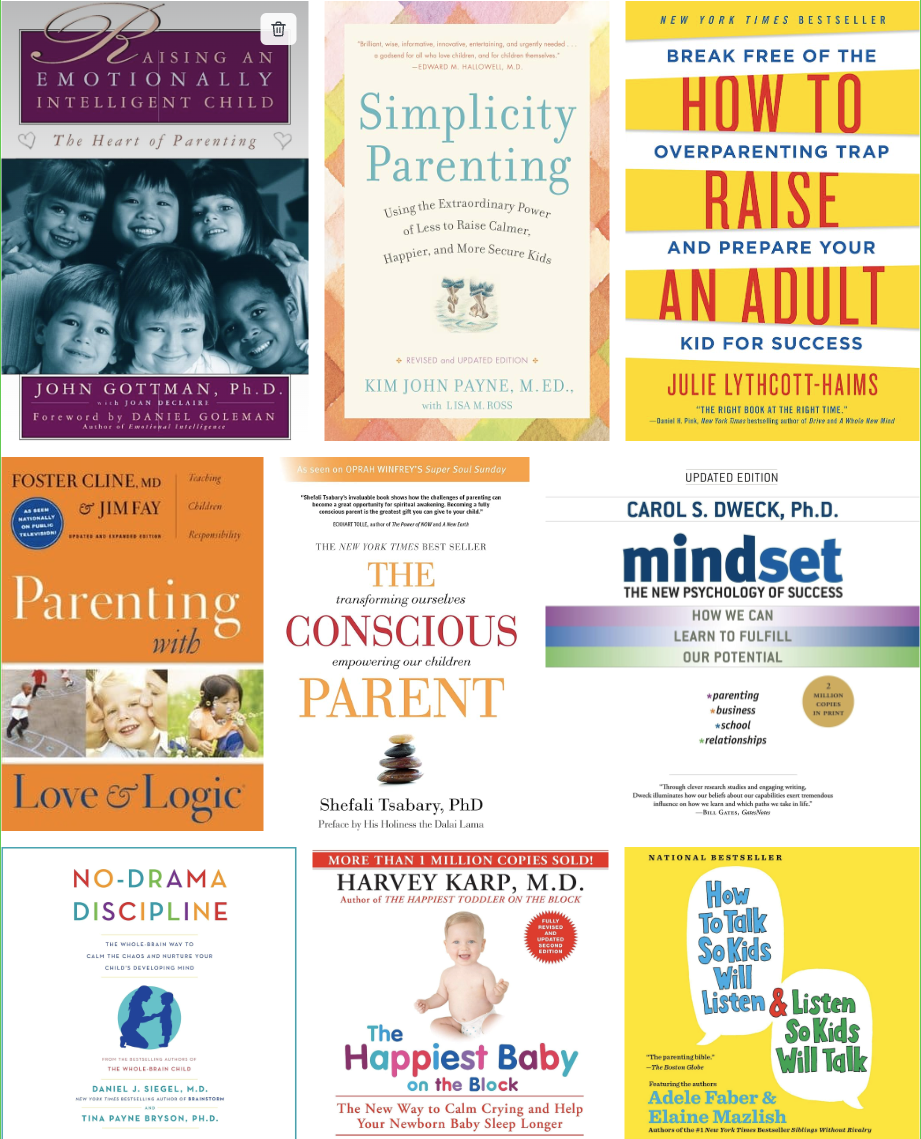
Parenting is a journey filled with questions, challenges, and joy. Whether you’re a first-time parent or navigating the teenage years, the right guidance can make all the difference. Here’s a curated list of the top 10 parenting books that every parent should have on their shelf. These books offer insights, practical advice, and emotional wisdom to help you become the best parent you can be.
Table of Contents
- The Whole-Brain Child by Daniel J. Siegel and Tina Payne Bryson
- How to Talk So Kids Will Listen & Listen So Kids Will Talk by Adele Faber and Elaine Mazlish
- The Happiest Baby on the Block by Harvey Karp
- No-Drama Discipline by Daniel J. Siegel and Tina Payne Bryson
- Mindset: The New Psychology of Success by Carol S. Dweck
- The Conscious Parent by Dr. Shefali Tsabary
- Parenting with Love and Logic by Charles Fay and Jim Fay
- How to Raise an Adult by Julie Lythcott-Haims
- Simplicity Parenting by Kim John Payne
- Raising An Emotionally Intelligent Child by John Gottman
The Whole-Brain Child by Daniel J. Siegel and Tina Payne Bryson
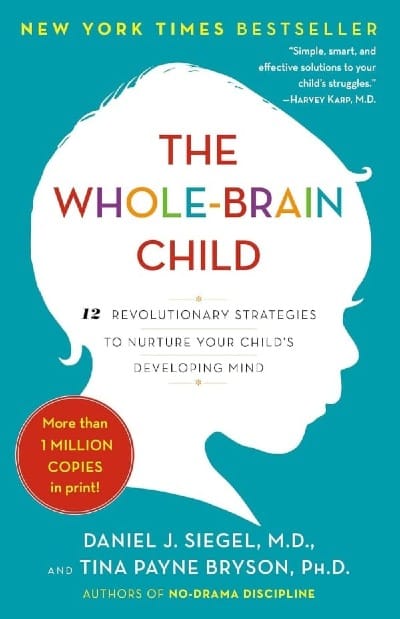
"Our children’s brains are constantly developing, and how we respond to their behaviors plays a huge role in how their brain connections form."
Dr. Daniel J. Siegel and Tina Payne Bryson team up to provide a science-backed guide to parenting, helping parents understand the connection between a child’s brain development and their behavior.
The Whole-Brain Child uses neuroscience to explain why children behave the way they do, especially during emotional outbursts. It gives parents practical strategies to help their children integrate their logical (left brain) and emotional (right brain) sides, creating a more harmonious and responsive child.
Insights and Takeaways:
- Offers 12 strategies to nurture brain development and improve emotional regulation in children.
- Helps parents understand their child’s brain, empowering them to respond more effectively to tantrums and emotional challenges.
Who is it for?
Parents of children aged 0-12 who are looking to better understand their child’s emotional and cognitive development.
How to Talk So Kids Will Listen & Listen So Kids Will Talk by Adele Faber and Elaine Mazlish
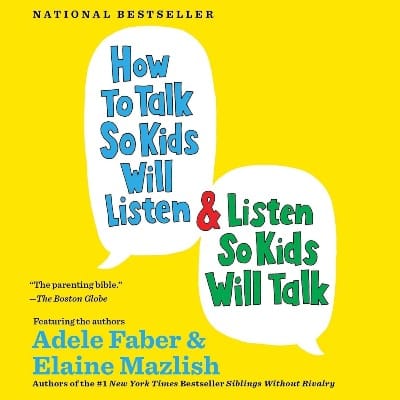
When we acknowledge a child's feelings, we show them that their emotions are valid, which builds emotional intelligence.
This timeless classic by communication experts Adele Faber and Elaine Mazlish has become a go-to for parents wanting to improve communication with their children.
The book teaches parents how to foster cooperation with their children without resorting to shouting or punishment. Instead, it offers techniques to acknowledge a child's feelings, reduce conflicts, and encourage better problem-solving within the family.
Insights and Takeaways:
- Focuses on empathy and active listening to create a more respectful relationship.
- Provides real-life examples and step-by-step advice for handling common parenting struggles like tantrums, sibling rivalry, and miscommunication.
Who Is It For?
Ideal for parents who want to enhance their communication skills with children, especially those dealing with frequent power struggles.
The Happiest Baby on the Block by Harvey Karp
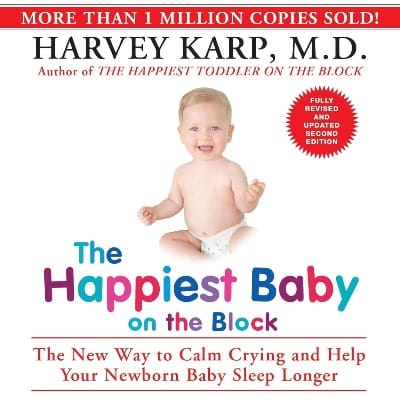
Crying is a baby’s first language. Your job is to become fluent in it.
Pediatrician Dr. Harvey Karp has gained fame for his simple, yet powerful, techniques to calm fussy and crying babies, particularly during the first few months of life.
What It’s About:
The book introduces the "5 S's"—Swaddle, Side/Stomach position, Shush, Swing, and Suck—which mimic the womb environment and help soothe even the most colicky of babies. Karp’s approach is rooted in understanding newborns' primal needs for comfort and security.
Insights and Takeaways:
- Teaches practical techniques that can reduce crying by up to 50%.
- Provides parents with tools to calm their babies and make the first few months more manageable.
Who Is It For?
New parents or parents-to-be who are preparing for the challenges of soothing a newborn.
No-Drama Discipline by Daniel J. Siegel and Tina Payne Bryson
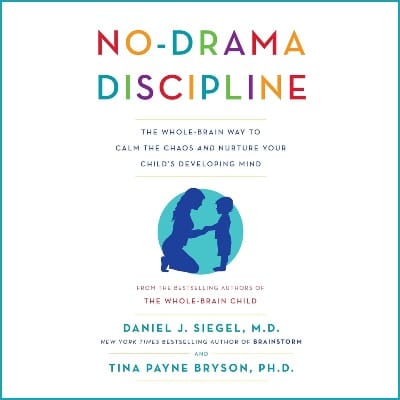
Discipline isn’t about punishment; it’s about teaching and guiding.
In No-Drama Discipline, the authors expand on the brain science presented in The Whole-Brain Child to show parents how to discipline without causing emotional harm or escalating conflict.
What It’s About:
The book offers a compassionate, non-punitive approach to discipline, helping parents understand their child’s behavior and guiding them through emotional regulation. The authors encourage “connect and redirect,” an approach where you first connect with your child emotionally and then redirect their behavior.
Insights and Takeaways:
- Stresses the importance of teaching, rather than punishing, during moments of discipline.
- Explains how to foster cooperation and reduce power struggles using empathy and connection.
Who Is It For?
For parents looking to discipline their children without yelling, punishment, or drama, while fostering emotional intelligence.
Mindset: The New Psychology of Success by Carol S. Dweck
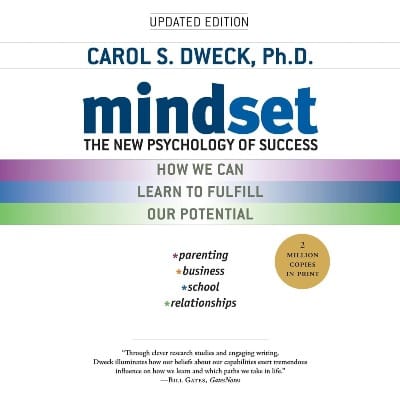
The view you adopt for yourself profoundly affects the way you lead your life.
Carol S. Dweck is a pioneering psychologist whose work on the “growth mindset” has become influential in parenting, teaching, and leadership.
What It’s About:
In Mindset, Dweck explains the difference between a “fixed mindset” and a “growth mindset.” Parents can use the concepts from this book to encourage their children to embrace challenges, learn from mistakes, and develop resilience, fostering lifelong success.
Insights and Takeaways:
- Teaches parents how to instill a growth mindset in children, where effort and learning are valued more than innate talent.
- Encourages resilience and curiosity, helping children develop a love for learning.
Who Is It For?
Parents of school-age children who want to nurture resilience, perseverance, and a love of learning.
The Conscious Parent by Dr. Shefali Tsabary
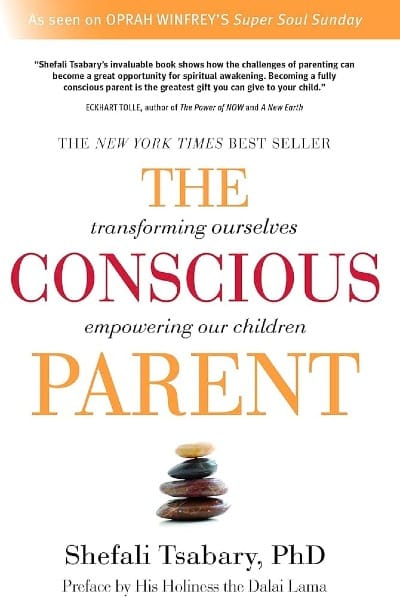
Parenting is a mutual journey of learning between parent and child.
Dr. Shefali Tsabary is a clinical psychologist and mindfulness expert who advocates for parenting that focuses on the parent’s self-awareness and personal growth.
What It’s About:
Unlike traditional parenting books that offer techniques for managing children, The Conscious Parent challenges parents to look within themselves and be mindful of their own behaviors and emotional responses. Tsabary emphasizes the importance of connection, acceptance, and authenticity in parenting.
Insights and Takeaways:
- Encourages parents to break free from societal pressures and parent with consciousness and presence.
- Emphasizes that raising children is also a journey of self-discovery for the parent.
Who Is It For?
Parents who are interested in a mindful, reflective approach to parenting, focusing on emotional growth for both parent and child.
Parenting with Love and Logic by Charles Fay and Jim Fay
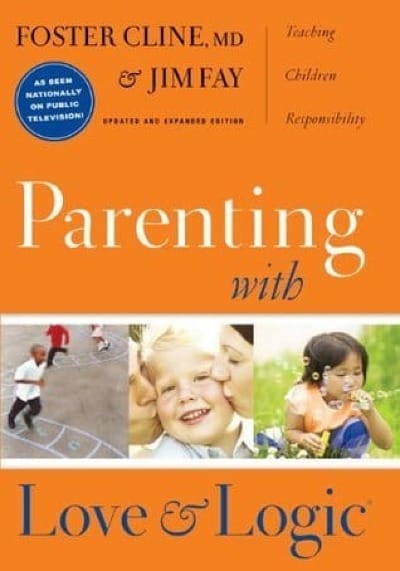
Children learn responsibility when they experience the consequences of their actions.
This father-son duo developed a practical, common-sense approach to parenting that focuses on allowing children to experience the natural consequences of their actions.
What It’s About:
Parenting with Love and Logic provides strategies to help children take responsibility for their decisions. Instead of relying on punishment, it encourages parents to let children learn from their mistakes while offering empathy and understanding.
Insights and Takeaways:
- Emphasizes giving children choices and letting them experience the natural consequences of their decisions.
- Encourages parents to avoid power struggles and instead offer empathy while allowing children to solve their own problems.
Who Is It For?
Parents who want to raise responsible, independent children without resorting to punishment or over-managing their decisions.
How to Raise an Adult by Julie Lythcott-Haims
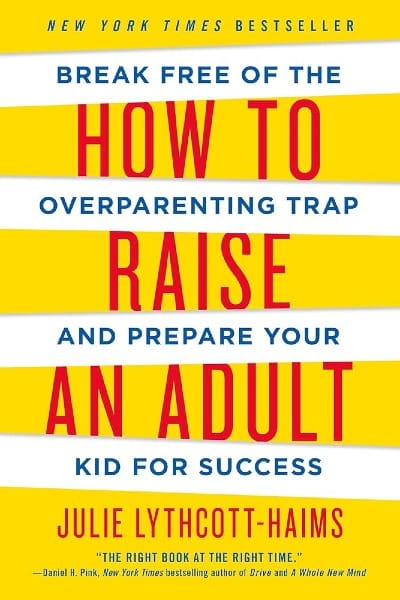
Resist the urge to do for your kids what they can do for themselves.
As the former Dean of Freshmen at Stanford University, Julie Lythcott-Haims has seen firsthand the negative effects of helicopter parenting. Her book offers a wake-up call to parents who want to raise self-sufficient children.
What It’s About:
How to Raise an Adult addresses the over-parenting phenomenon and offers practical advice on how to raise independent, confident young adults. Lythcott-Haims argues that by doing too much for our children, we hinder their ability to succeed on their own. The book provides a road map for letting go and empowering children to navigate the world independently.
Insights and Takeaways:
- Offers insights into the negative impact of over-parenting on young adults.
- Provides strategies for teaching independence, responsibility, and self-sufficiency.
Who Is It For?
Parents of teenagers or young adults who are preparing for their child's transition to independence or college life.
Simplicity Parenting by Kim John Payne
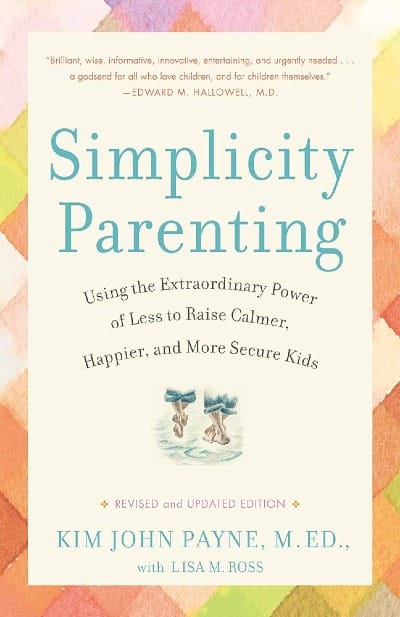
Too much stuff, too many choices, too little time. Modern life can overwhelm children and adults alike.
Kim John Payne is a family consultant who advocates for a simpler, less hectic approach to parenting. His book offers a counterbalance to today’s fast-paced, materialistic world.
What It’s About:
Simplicity Parenting offers strategies to simplify your child’s environment, reduce overstimulation, and create space for creativity and family connection. Payne argues that decluttering not only your physical space but also your child’s schedule can reduce stress and improve behavior.
Insights and Takeaways:
- Advocates for simplifying the home environment to reduce stress and behavioral issues.
- Offers strategies for reducing screen time, organizing toys, and creating meaningful family routines.
Who Is It For?
Parents who feel overwhelmed by the fast pace of modern life and want to create a more peaceful, less materialistic home environment for their children.
Raising An Emotionally Intelligent Child by John Gottman
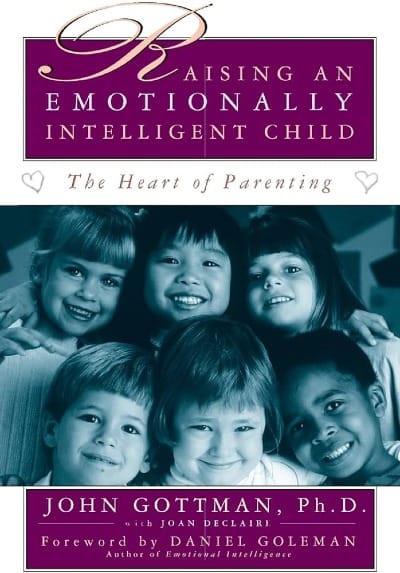
Emotion coaching begins by recognizing the child’s feelings and helping the child verbalize them.
Dr. John Gottman is a psychologist known for his research on emotional intelligence, relationships, and parenting. His book focuses on how parents can help their children develop strong emotional awareness and regulation.
What It’s About:
Raising An Emotionally Intelligent Child teaches parents the importance of “emotion coaching,” which helps children recognize, understand, and verbalize their emotions. Gottman provides practical techniques for turning emotional moments into opportunities for teaching self-regulation and emotional resilience.
Insights and Takeaways:
- Teaches parents how to help children manage and express their emotions in a healthy way.
- Provides tools to foster emotional intelligence, which can improve relationships and academic success.
Who Is It For?
Parents of children of all ages who want to focus on developing their child's emotional intelligence, helping them navigate the social and emotional complexities of life.
Which Parenting Book is Right for You?
Every parent’s journey is different, and there’s no single answer to the challenges of raising children. The books on this list provide a wide range of perspectives, from discipline and communication to emotional intelligence and self-sufficiency. Whether you're trying to better understand your baby’s crying, navigate the teenage years, or raise a responsible adult, these books offer valuable insights and practical advice.
- New parents might find The Happiest Baby on the Block or The Whole-Brain Child invaluable.
- Parents of toddlers and young children will benefit from the communication strategies in How to Talk So Kids Will Listen & Listen So Kids Will Talk and the discipline techniques in No-Drama Discipline.
- Parents of older children and teens can explore independence-building with How to Raise an Adult or emotional regulation with Raising An Emotionally Intelligent Child.
Whatever stage you're in, these books offer wisdom that can help you become a more mindful, connected, and effective parent.
To get short text summaries & audio summaries of these books, check out BookSummary.io, a platform that provides summaries for your favorite books.



